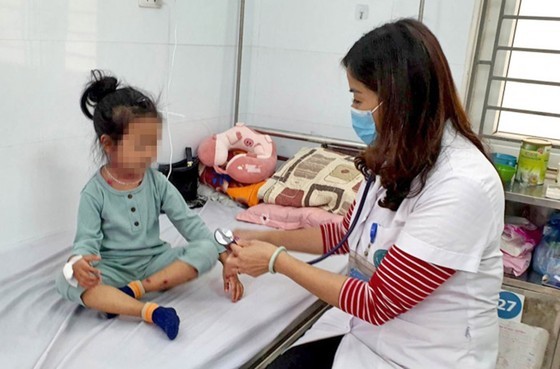 |
A doctor at the National Children's Hospital examines a child with chickenpox. |
Chickenpox is an infectious disease caused by the Varicella Zoster virus, and there is now a vaccine available for prevention. Although it is usually a mild illness, chickenpox can have unusual symptoms and carries the risk of severe complications, including death, particularly in children and pregnant women.
Rapid transmission, serious complications
According to statistics from the Ministry of Health, there have been about 4,000 reported cases of chickenpox nationwide since the beginning of 2023. In Hanoi alone, there have been over 1,400 cases, an increase of more than 21 times compared to the same period last year. Many hospitals in Hanoi and Ho Chi Minh City have noted a significant rise in the number of patients seeking treatment for chickenpox, with cases being reported daily. Some of these cases have even resulted in superinfections and complications, particularly respiratory inflammation.
In the past month, Bach Mai Hospital has admitted numerous patients with chickenpox for treatment. Among them, a 32-year-old man tragically passed away due to complications from pneumonia and liver failure. It is important to note that two weeks before being admitted to the hospital, the patient had been in contact with his son, who had chickenpox. Initially, the patient sought medical care at a private clinic, where he was diagnosed with chickenpox and was prescribed medication. However, because his symptoms did not improve, the patient's family took him to a lower-level hospital for further examination. As his condition deteriorated, he was subsequently transferred to Bach Mai Hospital, where he, unfortunately, passed away after four days of treatment.
Dr. Tran Thi Kim Anh, Head of the Tropical Department at Ha Dong General Hospital, stated that the hospital is currently admitting and treating over ten cases per week that require hospitalization. Among these cases are young adults who are admitted with symptoms such as high fever, fatigue, widespread rash, severe cough, and chest pain which are complications of viral pneumonia resulting from chickenpox. In addition, Hung Vuong General Hospital in Phu Tho Province has recently admitted and treated a 22-year-old patient who is 22 weeks pregnant and has a severe chickenpox infection.
In the southern provinces, although no deaths due to chickenpox have been reported, many hospitals are issuing warnings about an increasing number of cases. Since the beginning of the year, the HCMC Hospital for Tropical Diseases has recorded over 400 cases of patients seeking treatment for chickenpox, with several requiring hospitalizations due to severe complications. Dr. Truong Huu Khanh, Vice President of the Infectious Diseases Society of HCMC, explains that chickenpox is a commonly encountered infectious disease caused by the Varicella Zoster virus, which can affect both adults and children. Studies have indicated that children between the ages of 2 and 8 face the highest risk, while adults can also become infected if they are not fully vaccinated. It is worth noting that adults who contract chickenpox tend to experience more severe symptoms and are more susceptible to superinfection.
According to the World Health Organization, it is recommended that children between the ages of 1 and 12 who have not contracted chickenpox, as well as adults who lack immunity to the Herpes Zoster virus, should receive the chickenpox vaccine as a preventive measure. The chickenpox vaccine is considered safe and highly effective.
No specific treatment available
According to Dr. Nguyen Thi Quynh Nga, who is in charge of the Treatment and Special Care Department 1 at the National Children's Hospital, the virus that causes chickenpox can be transmitted from a mother to her child during pregnancy, or children can contract the disease through exposure to respiratory droplets in an environment where the chickenpox virus is present. Direct contact with infected caregivers can also lead to transmission. Children with chickenpox, especially newborns, are at a high risk of mortality, with up to 30 percent experiencing damage to multiple organs. Without prompt and appropriate treatment according to the recommended guidelines, children with chickenpox can develop severe complications such as respiratory failure, septic shock, and bacterial superinfections. Additionally, they may experience neurological complications such as meningitis, myelitis, optic neuritis, polyneuritis, kidney failure, and glomerulonephritis.
Currently, there is no specific treatment for chickenpox. The main approach to treatment usually focuses on alleviating symptoms and preventing dehydration in patients. As a result, proper care for individuals with chickenpox plays a crucial role. It is essential to ensure that they maintain a well-balanced diet, consume soft foods, and drink enough water. Daily throat hygiene with a saline solution is recommended. It is important to change clothes and bathe daily using clean warm water. It is advised to avoid scratching and breaking the blisters as it can lead to superinfection and scarring.
To prevent the disease, an effective measure is to vaccinate children aged 12 months and older with the chickenpox vaccine. According to numerous studies, if children have received the complete chickenpox vaccination, they have an 80 percent-90 percent chance of being protected against the disease. However, there is still a 10 percent risk of developing chickenpox even after vaccination, but these cases are typically mild, and complications are rare. Additionally, individuals who have contracted chickenpox should take 7-10 days off from school or work to prevent further spread of the disease.
























